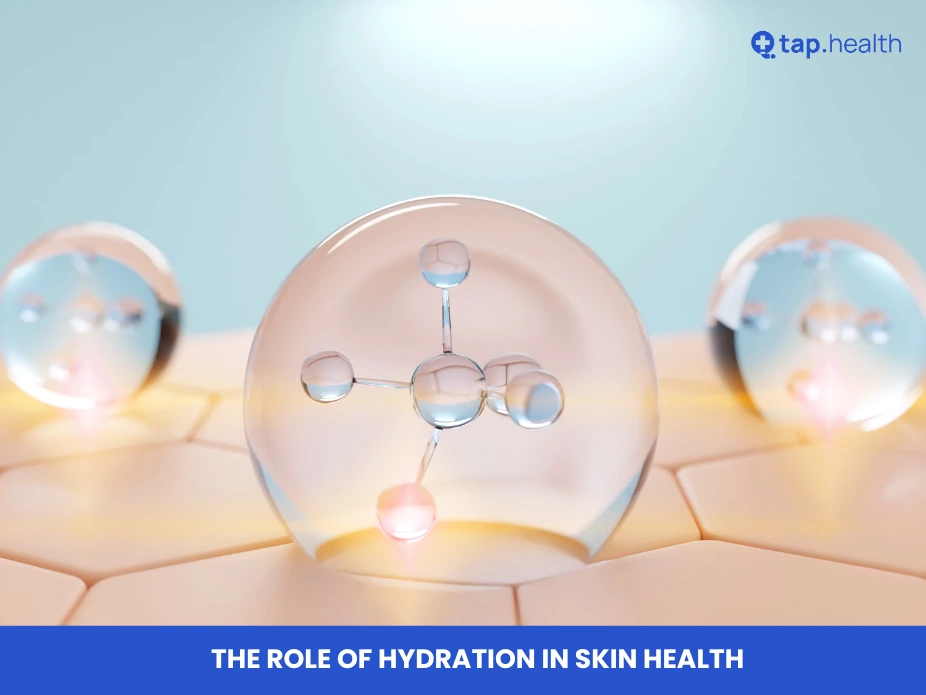What Is Skin Hydration and Why It Matters
Skin hydration means water content inside skin cells. It keeps barrier function strong, boosts elasticity, and gives radiant texture. Dehydrated skin looks dull, tight, with more fine lines and irritation.
Key Difference: Hydration vs Moisture
- Hydration: Water in cells for cell functions.
- Moisture: Oils and lipids on surface to lock water and shield from pollution, UV.
Both needed for healthy skin. Low hydration weakens barrier, raises sensitivity.
Top Benefits of Hydrated Skin
Proper hydration delivers:
- Better Elasticity: Reduces fine lines, keeps skin plump.
- Strong Barrier Function: Blocks environmental damage.
- Smoother Texture and Tone: Even, glowing look.
- Less Sensitivity: Cuts redness, irritation.
- Detox Support: Helps clear toxins for clearer skin.
Hydration Myths vs Facts: What Science Says
Myth 1: More Water Drinking Fixes Skin Hydration Fact: Water supports health, but excess gets excreted. Skin hydration depends on diet, climate, topical products. Study in British Journal of Dermatology shows no direct link from extra intake.
Myth 2: Hydration Stops Wrinkles Alone Fact: Improves elasticity, softens lines, but sun, genes, lifestyle matter more. Not a cure-all.
Myth 3: All Moisturizers Hydrate Equally Fact: Depends on ingredients and skin type. Hyaluronic acid, glycerin, ceramides excel at drawing and holding water.
Myth 4: You Can Overhydrate Skin Fact: Rare; skin self-regulates. Too many products may clog pores if unbalanced.
Myth 5: Only Dry Skin Needs Hydration Fact: Oily, combo types benefit too. Balances oil, cuts breakouts.
Real Stories: Hydration Success with Hyaluronic Acid and Glycerin
Sarah, 55, Teacher: Dry, flaky skin despite moisturizers. Added hyaluronic acid serum, upped water. Skin plumper, radiant in weeks.
Mark, 30, Marketer: Oily, breakout-prone. Avoided moisturizers at first. Switched to glycerin oil-free version. Oil balanced, fewer pimples.
Linda, 65, Retiree: Anti-aging focus. Used ceramides moisturizer, ate cucumbers, watermelon. Fewer lines, supple feel.
Expert Views on Skin Hydration Science
Dr. Emily Roberts, Dermatologist: “Water intake helps body-wide, but topical hyaluronic acid, glycerin build barrier. Holistic wins.”
Dr. Michael Lee, Nutritionist: “Antioxidant-rich foods, healthy fats boost moisture retention. Not just drinking—nourish skin.”
Jessica Martinez, Skincare Specialist: “Tailored routine: cleanse, tone, moisturize with ceramides. Matches skin type for best hydration.”
How to Boost Skin Hydration: Research-Backed Steps
- Daily Water Intake: 2 liters (8 glasses) baseline. Adjust for activity, heat.
- Key Ingredients:
- Hyaluronic acid: Holds 1000x weight in water.
- Glycerin: Pulls moisture in.
- Ceramides: Repair barrier, stop loss.
- Aloe vera: Soothes, hydrates.
- Squalane: Light, non-pore-clogging.
- Smart Moisturizer Use: Match type—creams for dry, gels for oily. Apply post-cleanse.
- Hydrating Diet: Cucumbers, watermelon, avocados, nuts with omega-3s.
- Environmental Protection: Sunscreen, hats against UV, wind.
- Gentle Cleansing: Twice daily, mild products to keep oils.
- Humidifiers: Add air moisture in dry seasons.
- Consistent Routine: Cleanse, tone, moisturize, protect daily.
Journal of Clinical and Aesthetic Dermatology: Hyaluronic acid tops up hydration, elasticity. Dermatologic Surgery: Moisturizers cut water loss, strengthen barrier.
Signs of Dehydrated Skin and Fixes
Tight, dull, fine lines, sensitivity? Dehydrated. Fix with hyaluronic acid serum, balanced water, ceramides.
Seasonal Hydration Adjustments
Winter: Heavier creams, humidifiers. Summer: Light gels, extra sunscreen.
Natural Hydration Remedies
Aloe vera gel, honey masks, coconut oil. Pair with water-rich foods.
FAQ: Hydration in Skin Health Answers
Q1: Does drinking water improve skin hydration?
A: Supports overall, but pair with skincare for real gains. Topical beats intake alone.
Q2: Can too much moisturizer damage skin?
A: If wrong type, yes—clogs, irritates. Balance routine.
Q3: Best ingredients for skin hydration?
A: Hyaluronic acid, glycerin, ceramides, aloe vera, squalane.
Q4: How to spot dehydrated skin?
A: Tightness, dullness, lines, irritation, uneven texture.
Q5: Need separate moisturizer with hydrating foundation?
A: Yes—dedicated gives deeper barrier support.
Q6: Diet affect hydration?
A: Yes—watery fruits, fats, antioxidants help retain moisture.
Q7: Humidity impact on skin?
A: High keeps moisture; low dries via water loss.
Q8: Change routine by season?
A: Absolutely—heavier winter, lighter summer.
Q9: Natural ways to hydrate skin?
A: Aloe, honey, coconut oil; hydrating eats.
Q10: Time for hydration results?
A: Days to week for start; weeks for best with consistency.
Wrap-Up: Master Hydration for Glowing Skin
Hydration drives elasticity, barrier, radiance. Skip myths—focus facts. Combine 2L water, hyaluronic acid/glycerin/ceramides products, nutrient diet, protection. Tailor to your skin, stay consistent. Consult pros for custom advice. Healthy, hydrated skin starts now.



